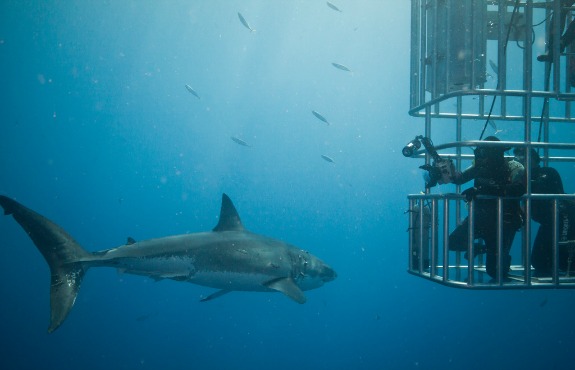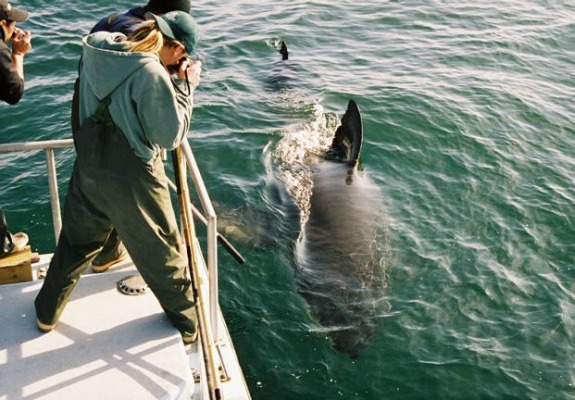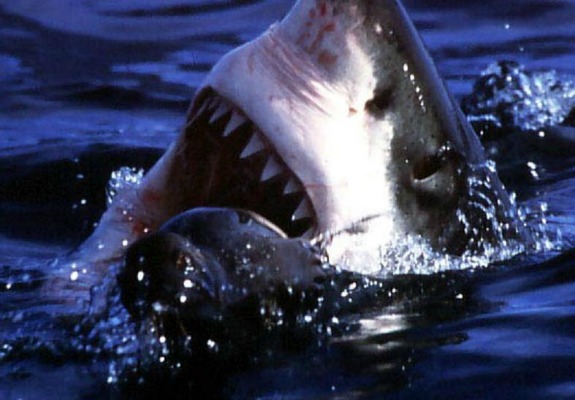Why the Idea of Killing Sharks to Make Waters Safer Is Absurd
The recent fatal shark attack off Western Australia has ignited a debate there over whether the fish should continue to be protected
With jaws made to kill, do great white sharks still deserve protected status in Western Australia, where they have killed five people in less than a year? Conservationists believe so. Photo courtesy of the Pelagic Shark Research Foundation.
The fifth fatal shark attack in less than a year in the coastal waters of Western Australia has put local swimmers, divers and surfers on edge. Authorities have tried to catch and kill the individual before it attacks again—but their efforts may not stop there. Some officials are already suggesting that lawmakers take a 180-degree turn in shark conservation practices, lift protections from great white sharks and allow people to fish for and kill the animals again after a 14-year moratorium.
The great white shark is a protected species in much of the world and considered vulnerable and threatened in places. Once the popular target of trophy fishermen, who used rods and reels like cranes to haul in sharks as large as two tons, the great white received protection in Western Australia following the International Union for Conservation of Nature’s labeling of the species as “vulnerable.”
But Western Australia Fisheries Minister Norman Moore says he will now be lobbying to legalize sport and commercial fishing for great white sharks in the waters under his jurisdiction.
The most recent attack took the life of 24-year-old Ben Linden, who was paddling on a surfboard on July 14 when a large great white bit the young man in half. A jet skier who came to assist said the shark circled around the victim’s remains before nudging the jet ski, then seizing Linden’s torso in its mouth and disappearing.
Linden’s death was preceded by several other similar events. On September 4, 2011, bodyboarder Kyle James Burden was killed at Bunker Bay, about 190 miles south of Perth. On October 10, 2011, Bryn Martin went missing while taking a swim at Cottesloe Beach in Perth. Later, only his Speedos were recovered. Then, an American tourist, 32-year-old George Wainwright, was killed October 22, 2011, while diving at Rottnest Island, near Perth. Finally, on March 31, 2012, another diver, 33-year-old Peter Kurmann, was attacked and killed near Busselton.
Now, after the Linden attack, people are rethinking how dangerous sharks are, how safe the water is and whether animals that kill people should be allowed to live. Certainly, the rapid-fire recurrence of shark attacks in the past year in Western Australia has been alarming, horrifying and sad, and Fisheries Minister Moore believes a heavy hand must be delivered to protect his state’s precious tourism industry.
“Five fatalities in Western Australia (in ten months) is unprecedented and cause for great alarm,” Moore recently told the press. “It won’t be helping our tourism industry, and those people who want to come here to enjoy an ocean experience will be turned away because of this situation.”He also said recently, “Further action is necessary to deal with it.”
Already, action has been taken. Shark cage diving, though a micro-tourism industry of its own, will probably be banned in Western Australia. Critics, including Moore, had said even before the Linden attack that such operations, which sometimes involve the use of bait and chum to attract sharks to the area and within viewing range of paying customers, could be responsible for bringing great whites into the proximity of heavily used beaches—and, worse, instilling in the sharks an association between humans in the water and free food.

Using hunks of tuna and mammal flesh to lure sharks toward tourists in cages (this shot was taken in Mexican waters) is a popular activity worldwide, but in Western Australia people have charged that chumming for great whites could be endangering swimmers at nearby beaches. Photo courtesy of Flickr user Scubaben.
It sounds terrifying. The thing is, sharks aren’t very dangerous. At least, they’re a lot less dangerous than cars, which we cherish and wash on Sunday afternoons and use for driving our kids to church, and for whose deadly wheels most societies all but lay out red carpets. In Western Australia alone, 179 people were killed in 2011 in automobile accidents. And in America, 150 vehicle occupants are killed every year when their cars hit deer in the road.
Sharks killed only 12 people in 2011—worldwide—according to the International Shark Attack File. So, if tourists are afraid of going into the ocean, they should be petrified at the thought of traveling on a paved highway to get there.
For now, lifting protections on great white sharks remains just an idea, and if the suggestion advances toward the desks of Australian lawmakers (who likely drove their cars to work), we will surely hear firm opposition from conservationists and others. In Santa Cruz, California, independent white shark researcher Sean Van Sommeran hopes that people will simply accept that sharks are a part of the environment in Australian waters, rather than back-stepping and rescinding protective regulations on the species.
“People need to come to terms with the environments they go into to recreate,” said Van Sommeran, the founder and director of the Pelagic Shark Research Foundation. “There are streams with crocodiles and forests with poisonous snakes, and there are sharks in the water. You just need to adjust your behavior to a place, not the other way around.”
Van Sommeran was among those who first campaigned for the protection of great white sharks in the early 1990s. By 1994, the species was fully protected in California waters, and by 1997 white sharks were illegal to take in all United States federal waters. Elsewhere, the species is likewise protected. In South Africa, a fishing ban took effect in 1991; in Namibia, in 1993; in Australia, in 1998; in Malta, in 2000; and in New Zealand, in 2007.
But Van Sommeran notes that these laws have been repeatedly bent to allow for white shark capture in the name of science.
“By 2001, the laws were being undermined by aquariums and scientific collection projects,” he said. The Monterey Bay Aquarium, for example, has offered payment to commercial fishermen who accidentally catch and then turn over juvenile great white sharks, with fees varying depending on the condition of the animal—and top dollar going for live juvenile sharks, which have periodically become popular tourist draws at the aquarium. And in the past several years, laws forbidding white shark fishing have been waived for documentary television crews. The shows Expedition Great White, Shark Men and Shark Wranglers have each portrayed teams of scientists hooking and landing adult great whites, hauling them aboard their vessels and spending 20 minutes or more prodding the animals and fitting them with SPOT, or Smart Position and Temperature, tags. Many critics of the activity have warned that SPOT tagging procedures are potentially harmful to larger sharks.

In many locations in the world, boat captains attract sharks toward their vessels as paying clients in underwater cages watch. In a few places, anglers may still fish for great whites. Here, a great white shark swims beneath a California research boat and its admiring crew. Photo courtesy of the Pelagic Shark Research Foundation.
The popularity of sharks in mainstream culture seems to have increased with more and more televised presentations of sharks in their natural habitats, and the men and women who study them—but concern for sharks’ protection has not necessarily grown, Van Sommeran believes.
“Sharks generate a strange kind of enthusiasm that isn’t at all confined to conservation,” he said. He explains that many of the people stoked on sharks are only stoked on the prospect of catching them. Even today, catch-and-kill shark tournaments are held every year in the United States.
Van Sommeran warns that any steps backward in protecting great white sharks could set a precedent for changing laws that protect other large predators.
“If we remove the protected status of every species that runs afoul of humans, we’ll run out of bears, lions and tigers really soon,” he said.
The International Shark Attack File reports that sharks of all species made unprovoked attacks on 75 people in 2011. The database file adds that shark attacks have grown increasingly common since 1900—a trend that most likely reflects the increasing popularity of surfing, diving, bodyboarding and other water sports. It’s also a trend that comes in spite of the world’s declining populations of sharks, of which people kill 30 million to 70 million per year, according to the International Shark Attack File.
So, perhaps the bottom line to this story should be that although shark attacks are frightening and tragic for those involved, they are not a relatively significant per-capita danger. You might even be safer in the water today than a century ago.
Just be really, really careful while driving to the beach—and beware of hitting a deer.
Following recent attacks, is it time that laws protecting great white sharks be changed? Tell us what you think in the comment box below.
/https://tf-cmsv2-smithsonianmag-media.s3.amazonaws.com/accounts/headshot/Off-Road-alastair-bland-240.jpg)

/https://tf-cmsv2-smithsonianmag-media.s3.amazonaws.com/accounts/headshot/Off-Road-alastair-bland-240.jpg)